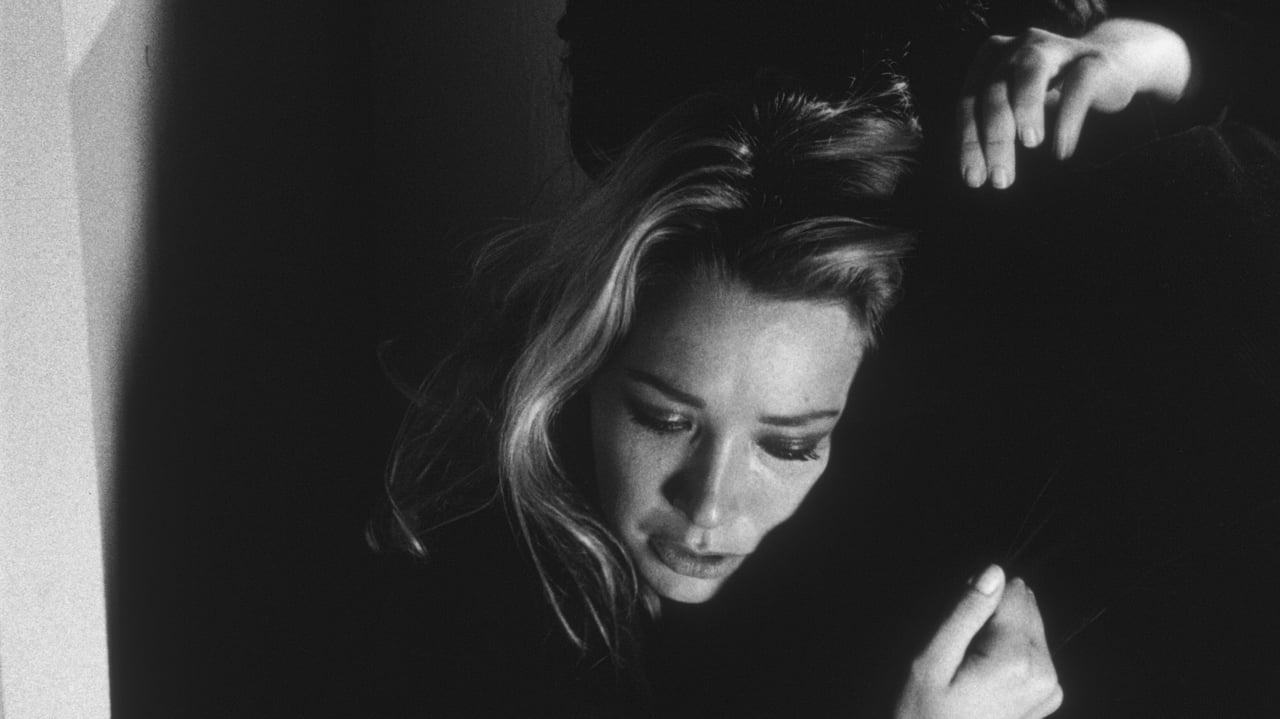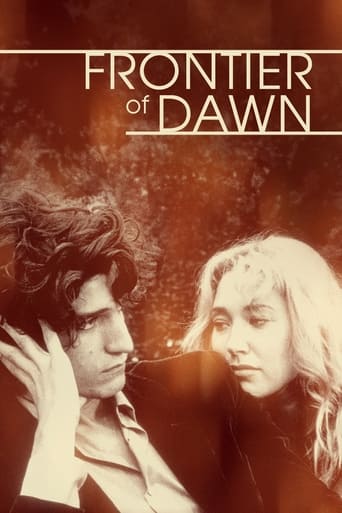tigerfish50
This threadbare tale of a photographer's amorous misadventures demonstrates that pretentious sixties-style, cinematic vanity projects still survive in twenty-first century France. Shot in self-consciously 'artistic' B&W, the opening sequence depicts the poetically rumpled Francois arriving to shoot some publicity stills of a young married actress, Carole, whose film-maker husband is absent in Hollywood. Despite Carole's lack of any discernible charisma, Francois falls under her spell, and they embark on a supposedly obsessive love affair. It's soon apparent that the film is going to be a slow-motion train-wreck, since the director spends far too much time on tedious shots of the couple asleep or staring moodily into the distance, while neglecting to develop his characters or their unconvincing relationship. Consequently it seems somewhat capricious when Carole suddenly suffers a breakdown, sets fire to her apartment, and is consigned to an asylum where she writhes around theatrically in a straitjacket.After her release, there is a sequence of scenes which illustrates the arbitrary, lazy nature of the entire script. Carole tells Francois that she's going to reconcile with her husband, and then, with a cringe-inducing bout of over-acting, returns to her hotel room to drown her sorrows in a bottle of gin. Francois tries seeking solace with a new love interest, but memories of his old romance undermine his mental stability, and drive him on to the melodramatic destiny that awaits him."Frontier of the Dawn" makes even less sense on the screen than it does on paper, and director Garrel requires his son to do little more than adopt stock romantic poses in the main role of Francois. As a result, it's easy to see why the Cannes Festival audience greeted the film's producers with whistles of derision for wasting their time with such a pompous piece of puerile piffle.
Aristides-2
Tedious movie that is older in spirit than the black & white visual design indicates. Two love stories? Only if your definition of love consists mainly of physical desire. Don't any of the two women and man have anything of value to say to each other that would show sexual chemistry melding into mature love? No wonder angst and uncertainty reigns in both relationships: they don't speak meaningfully to each other. They never get to know each other. (Yeah, this could be an homage to the existential relationships Antonioni was so addicted to 50 years ago.) Then, near the end of the movie the rug is pulled out from the viewer. Up till then we were shown two stories, very slow moving but realistic stylistically and we're led to believe that the man in the film was becoming psychotic. He was hallucinating. But no! After his personal demons cause his suicide, we see an image in the movie that is a real Demon; it's a supernatural tale after all!
robert burton
While it seemed to divide audiences at Cannes showing and has yet to find a wide release,Garrel's latest film is almost as good as anything he has done over the last forty years.Exquisitely photographed by William Lubtchansky,the regular cameraman of Rivette,it depicts a strangely deserted,almost spectral, Paris devoid of tourists and the constant hum of mobile phones.Louis Garrel plays François,a trendy photographer who starts an affair with an unstable married woman.Eventually she is confined to an asylum and commits suicide. After a period of time he has a relationship with a more conventional girl who becomes pregnant.He is accepted by her family and happiness seems to beckon but his obsessive love for the dead woman comes back to haunt him in a manner reminiscent of Cocteau.There is little dialogue throughout,and like most of his previous work there is a purity of image which is reminiscent of the silent cinema.Unlike "Les amants réguliers",his previous film which was a reflection on the disillusionment of politics,this is more of a return to the subject of obsessional love which has haunted most of his oeuvre.
Chris Knipp
Philippe Garrel's films exist in a gloomy romantic limbo. They hover somewhere between now--in his last two, the star is his young son Louis--and the Sixties or Seventies. They draw heavily upon autobiographical elements. Parisian intellectual and artistic spirit sinks under the weight of irresistible but unhealthy sexual entanglements. Here again his new film, 'La Frontière de l'aube,' is a lush sensual pleasure to watch, shot in gorgeous contrasty black and white by the director's twenty-year collaborator, William Lubtchansky. No cell phones here, only wine glasses and candlelight. When the two lovers need to communicate over a distance they use not text messaging, but pen on paper.The film's star, Philippe Garrel's son Louis, whom a French commentator on IMDb dubs "the raven-haired prince of the cinematheque," indeed is a gorgeous, quintessentially photogenic young man whose uniquely dreamy Mediterranean looks make him the perfect romantic hero. He is the Young Werther and all his avatars. Ironically, Christophe Honoré's frequent uses of him have gradually revealed (in 'Dans Paris' and 'Love Songs') that in person the dreamboat is full of puckish humor. But in his father's masterful 1968 evocation, the 2005 'Regular Lovers' and here, on the edge of a tragic dawn, he looks into the mirror and a dead lover appears to him and calls to him to join her in the grave and he jumps, again, out the window. Here, his name is François and he is a photographer.They whistled at this in Cannes. Is is it an elegant and genuinely scary genre horror movie? A laughably corny evocation of the cinematic surrealism of Jean Cocteau? "A risible slice of pretentious hokum," as Variety's unmoved (Cannes) reviewer proclaimed? There are elements of self-parody, but this is too beautiful a film to dismiss just because of a little silliness. A romantic sine-curve trance like this demands that you give yourself to its mood utterly. If you do, this is a very nice long swoon. As the wise IMDb commentator suggests, "to make the phantasmagoria perfect" you should "have a bottle or two of cheap red wine before you dive into this one." Though not nearly as memorable as the contextually richer 'Regular Lovers,' this, whose intimacy and less period-specific style sets it closer to Garrel's 1990's film 'J'entends plus la guitare,' is also less exhausting to watch than, and just as hypnotic as, 'Regular Lovers.'Surrender herself to the mood is what Louis Garrel's co-star Laura Smet herself clearly does, in a compelling performance that includes one of the most detailed and unnervingly real of filmed pill-suicide sequences. Smet burst upon the world of French cinema five years ago in the intense 'Les Corps impatients'/'Eager Bodies.' More seasoned now and reportedly herself recently out of rehab, she plays an unstable star, Carole, living in a big empty apartment while her husband Ed (Eric Rulliat) is off in Hollywood neglecting her. François comes, timidly at first, to do a photo shoot. She shoos out the usual gang of Garrelian kibitzers, and she and the respectful camera-boy soon become lovers-- after moving into a hotel another day where they can focus better. François's shoot never quite ends. We never quite see the results of it either. But the whole film is a photo shoot; and Lubtchansky's eye is indistinguishable from François'. The young photographer falls in love. They talk about revolution and madness. She asks him if he'll still love her if she goes crazy.He laughs off that question, but it becomes a serious one. Carole drinks too much and uses too many pills. She loses control and is taken to a sanitarium where she is given shock treatments. François drifts away. Released, she commits suicide.A year later, François meets and prepares to marry a richer, more normal, more conventionally bourgeois girl. But as he becomes seriously involved with her, he begins having supernatural experiences -- or disturbingly real-seeming delusions. Increasingly when he looks in the mirror, he sees Carole glowering at him out of the darkness and, as time goes on, she begins calling to him to join her.In Garrel's film, everything is made hyper-real, and therefore unreal, by Lubtchansky's cinematography. François's meeting in the country with the family of his finance, the mythically named Ève (Clémentine Poidatz), could be a voyage through an enchanted forest. François's chat with a bohemian friend suggests perhaps the film's position is that suicide is fine but marriage a trap to avoid. Passing references to socialism and the Holocaust add to the impression, though, that this film's ideological content is only skin-deep. What isn't superficial or silly or shallow is the consistency of Philippe Garrel's unique cinematic style. It's both true that they don't make them like this any more, and that he still passionately and beautifully does. While I wouldn't want to miss a Garrel/Garrel collaboration, this one hasn't the magic of 'Regular Lovers,' and Honoré's work with Louis has been more fun, and allowed him, and us, to breathe more as well as explore more of this young leading man's casting possibilities.Shown at the Walter Reade Theater as part of the series Film Comment Selects of the Film Society of Lincoln Center, New York, in February 2009.

